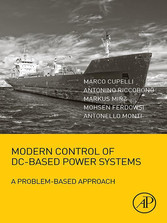Suche
Lesesoftware
Specials
Info / Kontakt
Modern Control of DC-Based Power Systems - A Problem-Based Approach
von: Marco Cupelli, Antonino Riccobono, Markus Mirz, Mohsen Ferdowsi, Antonello Monti
Elsevier Reference Monographs, 2018
ISBN: 9780128132210 , 302 Seiten
Format: ePUB, PDF
Kopierschutz: DRM




Preis: 105,00 EUR
eBook anfordern 







